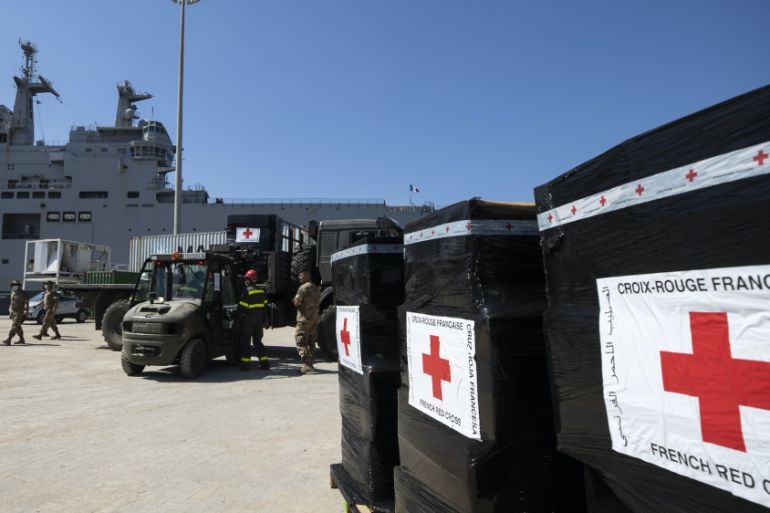To rebuild Lebanon and its economy, uproot corruption
As the world gathers aid for the people of Lebanon, it must ensure that it gets to those who need it.

On August 4, one of the largest non-nuclear explosions in history wreaked havoc on Beirut. Nearly 200 lives were lost, and more than 6,000 people were injured. An estimated 300,000 people were instantly left homeless. The blast obliterated homes, schools, medical facilities, and the port of Beirut, which supplies nearly 85 percent of the country’s food. Humanitarian relief efforts are already under way, but the longer-term reconstruction will take years. For Lebanon to truly recover, the country and its international partners will need to address something more insidious than the blast: corruption.
Lebanon was already on the verge of a humanitarian crisis. In 2019, the country’s economic collapse threw hundreds of thousands into poverty and exacerbated an already spiking unemployment rate, especially among the youth. The COVID-19 pandemic and the subsequent lockdown further deepened the hardship, including for more than one million Syrian refugees.
Keep reading
list of 4 itemsParallel seasons: How Lebanon hides from reality
Lebanon’s FIBA World Cup journey is about much more than basketball
Justice for the Beirut blast can help avert Lebanon’s collapse
Donors and international aid agencies have launched a humanitarian intervention to help the population cope. But the effort faces a significant challenge: how to channel hundreds of millions, if not billions, of dollars in aid without it being siphoned off by corruption.
For decades, Lebanon has suffered from systemic corruption that bankrupted the country. Many Lebanese hold political leaders responsible for the country’s economic collapse and today, many consider the port explosion to be yet another example of neglect. Several reports make clear that Lebanese officials knew about the presence of these lethal materials for years and failed to act.
Unlike in the past, Western donors appear wary of traditional assistance strategies that rely on the Lebanese government. “If reforms are not carried out, Lebanon will continue to sink,” said French President Emmanuel Macron.
John Barsa of USAID said firmly: “Our aid is absolutely not going to the government. Our aid is going to the people of Lebanon.”
To limit the opportunities for corruption, many donors are largely betting on the UN to spearhead the emergency relief efforts. However, this route is not without challenges. Some Lebanon watchers have voiced concerns over the undue influence of the Assad regime on UN aid operations in Syria. In Lebanon, the UN and other aid agencies have partnered in the past with Lebanese entities now associated with corruption, like the Council for Development and Reconstruction (CDR), a “key partner of the UN in Lebanon,” or with NGOs founded by or tied to members of the political elite.
To address these fears, international aid organisations must reassert their independence from Lebanon’s political elite. For example, UN agencies should exercise greater scrutiny when partnering with governmental or non-governmental bodies. They should also strive to strengthen transparency around aid delivery. Such measures could include the timely and regular release of programme budgets and aid distribution data; a communications plan and formal dialogue with aid beneficiaries; and dedicated staff to monitor aid delivery. Indeed, some of these steps may already be under way.
Second, international aid agencies must empower Lebanese civil society in the relief effort. Fortunately, Lebanon already has a robust landscape of local activists and groups dedicated to the needs of the vulnerable. In addition, new grassroots networks emerged last year during the country’s economic implosion, and the blast sparked a groundswell of citizen mobilisation. Donors and the UN will need to prioritise the flow of resources to these groups and include them in decision-making. The UN’s Lebanon Response Fund allocated roughly a quarter of its money through local NGOs in 2019. While impressive, that local share will need to grow. Finally, Lebanese civil society should be given a greater role with respect to oversight and accountability.
Third, donors and international financial institutions (IFIs) must address corruption as part of the wider reconstruction effort. The World Bank estimates that Lebanon will need up to $2bn for recovery. Fortunately, it appears to be taking the corruption issue seriously, calling for a series of anti-corruption measures as part of the rebuilding process. These include a new national anti-corruption commission and a call for Lebanon to join the Open Government Partnership. The Bank has also floated the idea of a new type of financing facility that could channel resources directly to NGOs engaged in recovery.
All of these would be steps in the right direction. However, bilateral and multilateral donors will still need a legitimate Lebanese governmental counterpart with whom to do business. This is particularly true for the International Monetary Fund (IMF) with whom talks have stalled over a bailout for Lebanon’s economy. Addressing this dilemma will certainly require some innovative thinking.
Any real reform agenda – one that uproots Lebanon’s entrenched corruption – will face great resistance by the elite. But as the world gathers support for the people of Lebanon, it cannot lose sight of this goal if aid is to get to those who need it.
The views expressed in this article are the authors’ own and do not necessarily reflect Al Jazeera’s editorial stance.